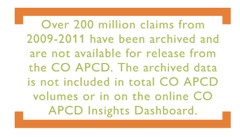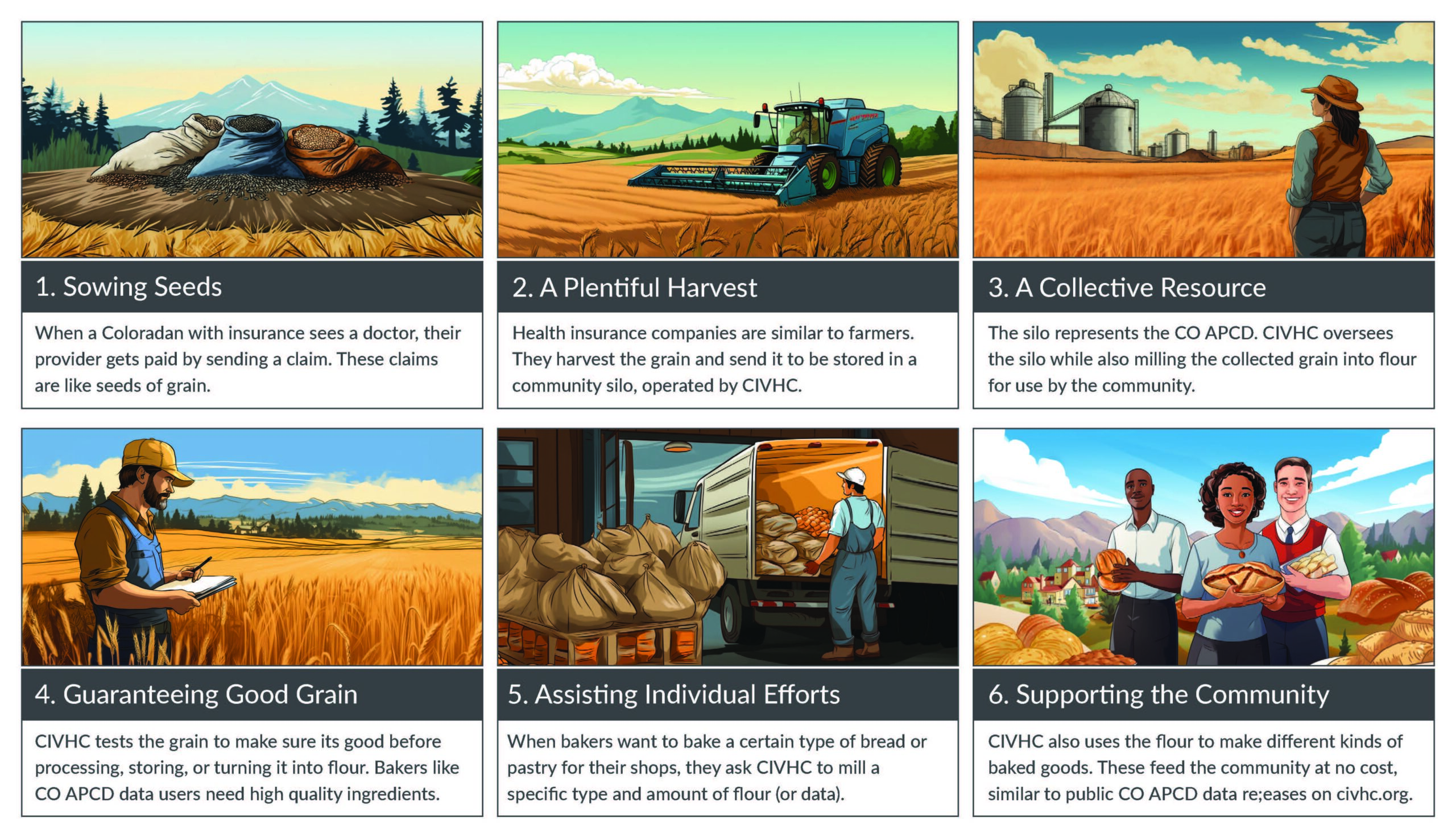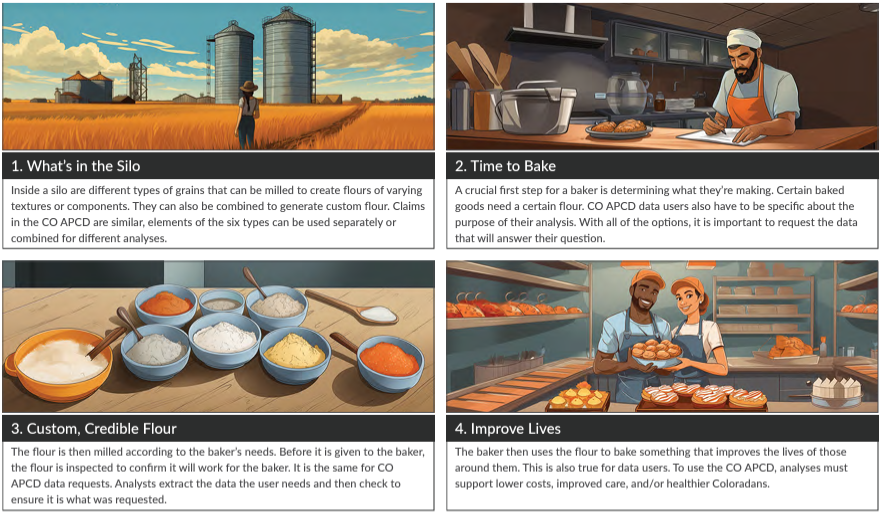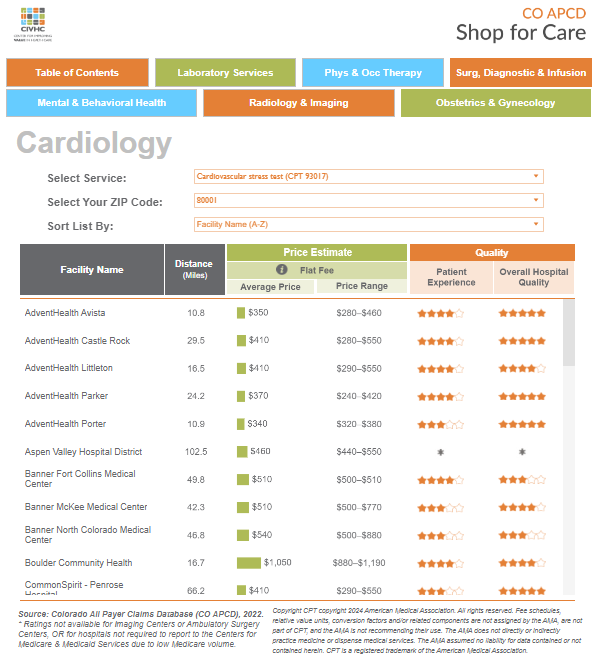The Colorado All Payer Claims Database (CO APCD) is a state-legislated, secure health care claims database compliant with all federal privacy and antitrust laws. It is the only claims repository in the state that represents most insured lives in Colorado, with more than ten years of data from commercial health insurance payers, Medicaid, and Medicare.
Contents of the CO APCD

The CO APCD currently contains over one billion claims for over 70% of Coloradans with medical coverage (over 10 million unique individuals across all coverage types), with information from commercial health insurance plans, voluntarily-submitted Employee Retirement Income Security Act (ERISA) self-insured and mandated non-ERISA self-insured employer plans, Medicare Advantage, Medicare Fee-for-Service (FFS), and Medicaid. The CO APCD does not contain claims for people covered by Federal health insurance programs such as the Veterans Administration, TRICARE, Federal Employees Health Benefits, or Indian Health Services, and does not include information for uninsured Coloradans. For more information regarding the number of lives, payers, and more that are in the CO APCD, and how it has changed over time, visit the CO APCD Insights Dashboard.
Due to a 2016 ruling by the United States Supreme Court, states cannot mandate submission of claims data from self-insured Employee Retirement Income Security Act (ERISA) employer plans to APCDs. Self-insured claims are estimated to represent half of the total commercially insured lives in Colorado and CIVHC estimates that the CO APCD currently contains approximately 50% of all self-insured plans, including 25% of ERISA self-insured plans.
Getting Claims into the CO APCD
Explanations of how claims data and the CO APCD work can be technical and difficult to follow. This graphic helps make it easier to understand how claims come to the CO APCD and how CIVHC is able to use it.

How the CO APCD is Used
CIVHC releases CO APCD data in two ways:
- Non-public releases, for individuals or organizations to use to improve care for Coloradans.
- Public data, for anyone to use to help make data-driven health decisions
Non-Public Data Releases
CIVHC provides non-public data sets and reports to organizations and researchers seeking to conduct analysis to identify ways to lower costs and improve the quality of health care. Every release of data must benefit Colorado, as mandated by CO APCD regulations, as well as adhere to federal privacy and anti-trust laws. Learn about projects powered by CO APCD data on the Change Agent Index.
This graphic helps explain how CIVHC fulfills data requests to meet the unique needs of Change Agents.

There are several ways non-public CO APCD data is provided, depending on the question the requestor is hoping to answer and their experience using claims data. For Change Agents who do not have time or the expertise to analyze data on their own, CIVHC can provide a custom report in a business intelligence or data visualization tool like Tableau or Excel. When partners have a strong analytic background and are interested in performing their own analyses using tools of their choosing, CIVHC provides them with a custom or standard data set. Depending on the level of personal health information (PHI) required, data sets are de-Identified, limited, or fully identifiable. Every request containing any element of PHI is reviewed in detail by the Data Release and Review Committee to ensure it meets all state and federal privacy regulations prior to approval and production. Learn more about CIVHC’s non-public data release products and options.
Public Data Releases
 Increasing access to transparent health care data for all Change Agents is foundational to the legislative vision of the CO APCD, CIVHC’s mission, and the State’s ability to make informed decisions that will have lasting benefits for Coloradans. Making public analyses and interactive tools available on civhc.org is one of the methods CIVHC employs to bring transparency to the health care marketplace. For example, CIVHC’s signature Shop for Care tool is available to help patients identify where they can go to receive the best care at the lowest price for procedures and services.
Increasing access to transparent health care data for all Change Agents is foundational to the legislative vision of the CO APCD, CIVHC’s mission, and the State’s ability to make informed decisions that will have lasting benefits for Coloradans. Making public analyses and interactive tools available on civhc.org is one of the methods CIVHC employs to bring transparency to the health care marketplace. For example, CIVHC’s signature Shop for Care tool is available to help patients identify where they can go to receive the best care at the lowest price for procedures and services.
Public releases of CO APCD data are used widely in Colorado. Visit civhc.org to access all publicly available reports and request underlying data for most analyses. Contact us at info@civhc.org to learn more.
